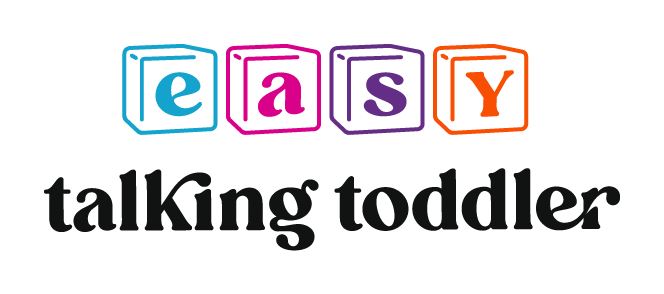If your toddler doesn’t seem to be talking at the same rate as their peers, you may find yourself wondering what is going on. And you may also be wondering what help could possibly look like. So this post is all about what is speech therapy for toddlers, and how it can help your child.
As a speech therapist myself, I’ve helped over 1,000 children with speech-language disorders. And I understand that it can be confusing for parents on how best to help their child. So hopefully this information will help you get started.
What is Speech Therapy for Toddlers?

Speech therapy helps toddlers and young children develop communication skills. We do this through teaching them to both understand and express themselves through language.
Toddlers who are not hitting their speech milestones can benefit from early intervention with speech therapy. Late talkers can sometimes catch up on their own, but early intervention with therapy helps them catch up much quicker, and eliminates the gap between their developmental level and their peers.
The goals of speech therapy for toddlers are to improve their communication skills, address possible developmental delays, and help the child express their thoughts effectively.
How Can Speech Therapy Help My Child?
1) By Giving You the Tools To Help at Home
As speech therapists, we are trained to give parents the tools to work on speech every day in every interaction. As one parent once told me, “I never realized how much my toddler learned from every individual interaction with me. It’s incredible.”
Your toddler is truly learning from every interaction, so working with a speech therapist allows you to learn how to make the most of that learning time at home to help your toddler reach their language milestones.
Early intervention programs, like Early Start in the US, often involve coaching parents on how to support language at home.
We also provide a research-backed approach. Parent-implemented interventions have shown strong effectiveness in studies such as those reviewed in the Journal of Early Intervention (2008).
2) By Calming Worries & Answering Questions
Wondering if your child is meeting developmental milestones or not can be very stressful.
Speech therapy allows you the chance to get your worries and questions answered by an expert.
Diagnosing toddlers can be very complicated, and it’s sometimes difficult to interpret the information on your own. But working with an expert helps parents navigate this complicated and emotional situation.
3) By Teaching Your Toddler Language Skills
Most importantly, as speech therapists, our job is to teach your toddler language skills so they can effectively communicate their thoughts and feelings.
Imagine landing on Earth as an alien and needing to figure out what people are saying– it would be difficult! That is exactly what babies are doing.
And speech therapists and language researchers know the tools that will work for your child to help them with the huge task of learning language. Before they can learn to speak in a sentence, they first have to learn where a word stops and begins.
If you are looking for ways to help your child on your own, my self-paced course actually teaches parents how to teach their child to do this very thing.

Late Talker Evaluation
The first step in addressing your child’s potential speech delay is to have them evaluated. A late talker evaluation can help identify what your child’s needs are when it comes to therapy, and will give you a plan for moving forward.
If you are concerned about your toddler’s progress with their speech and language, I encourage you to check out the evaluation.
Later Talker Evaluation

I’m Guy Garcia. I have successfully treated over 1000 late-talking toddlers, I am a board-certified speech-language pathologist, and I am the founder of Easy Talking Toddler.
